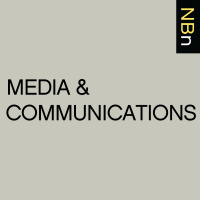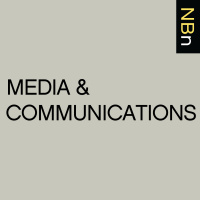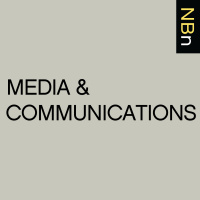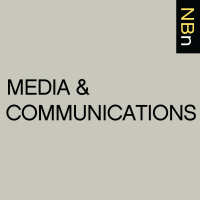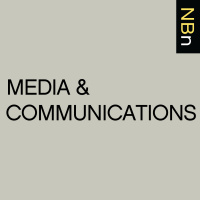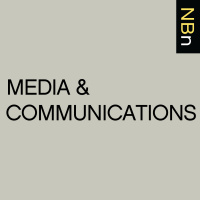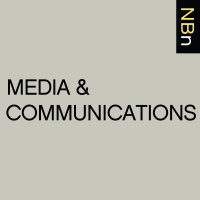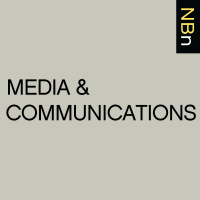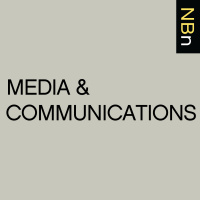Synopsis
Interviews with Scholars of Media and Communications about their New Books
Episodes
-
Alejandra Dubcovsky, “Informed Power: Communication in the Early American South” (Harvard UP, 2016)
26/04/2016 Duration: 43minInformed Power: Communication in the Early American South (Harvard University Press, 2016) maps the intricate, intersecting channels of information exchange in the early American South, exploring how people in the colonial world came into possession of vital knowledge in a region that lacked a regular mail system or a printing press until the 1730s. Challenging the notion of early colonial America as an uninformed backwater, Alejandra Dubcovsky uncovers the ingenious ways its inhabitants acquired timely news through largely oral networks. Information circulated through the region via spies, scouts, traders, missionaries, and other ad hoc couriers and by encounters of sheer chance with hunting parties, shipwrecked sailors, captured soldiers, or fugitive slaves. For many, content was often inseparable from the paths taken and the alliances involved in acquiring it. The different and innovative ways that Indians, Africans, and Europeans struggled to make sense of their world created communication networks that
-
Jason Mittell, “Complex TV: The Poetics of Contemporary Television” (NYU Press 2015)
18/04/2016 Duration: 01h06minWe are said to be in a golden age of TV. The best stories today are told on television screens in serialized forms. The Wire, Lost, Breaking Bad, The Sopranos are a few of the shows that have elevated the cache of television, introducing riskier forms of storytelling in a medium that has been typically formulaic and convention bound. Fans and critics alike celebrate them for innovation and television networks are filled programming with more and more of them. In Complex TV: The Poetics of Contemporary Television (NYU Press 2015), is film and television scholar Jason Mittell of Middlebury College offers a sustained analysis of the poetics of television narrative, focusing on how storytelling has changed in recent years and how viewers make sense of these innovations. Complex television, Mittell says, is not a genre. It is a storytelling mode and set of associated production and reception practices that span a wide range of programs across an array of genres. Through close analyses of key programs, includingTh
-
Benjamin Castleman, “The 160-Character Solution: How Text Messaging and Other Behavioral Strategies Can Improve Education” (Johns Hopkins UP, 2015)
03/04/2016 Duration: 58minTeenagers live in their phones. As an educator you can try to pull them away or meet them where they are. The 160-Character Solution: How Text Messaging and Other Behavioral Strategies Can Improve Education (Johns Hopkins University Press, 2015) urges educators to meet teens on their must-have device. Author Benjamin Castleman of the University of Virginia shows how text messaging combined with insights from behavioral science―more specifically the fields of behavioral economics and social psychology―can be leveraged to help students complete assignments, perform to their full potential on tests, and choose schools and colleges where they are well positioned for success. In his own research, Castleman has studied how to use personalized text messages to reduce “summer melt,” in which up to 40 percent of high school graduates who have been accepted to college, mostly from underserved communities, fail to show up for the fall semester. Behavioral strategies extend beyond texting and even beyond smartphon
-
Jonathan Donner, “After Access: Inclusion, Development, and a More Mobile Internet” (MIT Press, 2015)
14/03/2016 Duration: 01h05minThanks to mobile phones, getting online is easier and cheaper than ever. In After Access: Inclusion, Development, and a More Mobile Internet (MIT Press, 2015), Jonathan Donner challenges the optimistic narrative that mobile phone will finally close the digital divide. How we log on, how long we stay, what we choose to do, what we can do – all are shaped by our environments, resources and digital literacies. After Access examines the implications of the shift to a more mobile, more available Internet throughout the developing world. Donner addresses these implications specifically for socioeconomic development and broad-based inclusion in a global society. He offers a note of caution about the Panglossian views of mobile phones arguing that access and effective use are not the same thing, and the digital world does not run on mobile handsets alone. Donner, a Senior Director of Research at Caribou Digital, a UK-based consultancy focused on building inclusive digital economies in the developing world. After Acc
-
Fowler, Franz, and Ridout, “Political Advertising in the United States” (Westview Press, 2016)
14/03/2016 Duration: 24minErika Franklin Fowler, Michael M. Franz, and Travis N. Ridout are the co-authors of Political Advertising in the United States (Westview Press 2016). Fowler is assistant professor of government at Wesleyan University, Franz is associate professor of government and legal studies at Bowdoin College, and Ridout is Thomas S. Foley Distinguished Professor of Government and Public Policy in the School of Politics, Philosophy, and Public Affairs at Washington State University. The authors, co-directors of the Wesleyan Media Project, draw from the latest data to analyze how campaign finance laws have affected the sponsorship and content of political advertising and how the Internet has changed the distribution of ads. With detailed analysis of presidential and congressional campaign ads and discussion questions in each chapter, Political Advertising provides an ideal explainer for students, scholars and practitioners who want to understand the ins and outs of political advertising. Learn more about your ad choices.
-
David R. Brake, “Sharing our Lives Online: Risks and Exposure in Social Media” (Palgrave Macmillan, 2014)
29/02/2016 Duration: 46minWith the growth of social media like Facebook, Twitter, Instagram, and Snapchat, we are increasingly heading toward a radically open society. In Sharing our Lives Online: Risks and Exposure in Social Media (Palgrave Macmillan, 2014), author David R. Brake explores some of the social and individual harms that can arise from unwary social media use. Brake draws upon in-depth interviews with bloggers as well as scholarly research to explore why users may inadvertently reveal more online than they suppose. He explains in detail the social, technological, and commercial influences and pressures that keep us posting what we often shouldn’t and that prevent us from fully appreciating the risks when we do so. Learn more about your ad choices. Visit megaphone.fm/adchoices
-
Jeffery Pomerantz, “Metadata” (MIT, 2015)
22/02/2016 Duration: 43minWhat is the “stuff” that fuels the information society in which we live? In his new book, Metadata (MIT 2015), information scientist Jeffrey Pomerantz asserts that metadata powers our digital society. After defining metadata-data that has the potential to provide information about an object-Pomerantz considers the various kind of metadata. This raw material provides descriptions about individuals and most every other thing in the world. This data allows people, places, and things to be found. According to Pomerantz, metadata has become infrastructural as it plays such a pivotal role about in all of the things we do, yet, it is invisible. This invisible foundational material is created and collected all the time, and has vast implications for governments, corporations, and individuals. Learn more about your ad choices. Visit megaphone.fm/adchoices
-
Finn Brunton, “Spam: A Shadow History of the Internet” (MIT Press, 2013)
16/02/2016 Duration: 59minFinn Brunton‘s Spam: A Shadow History of the Internet (MIT Press, 2013) is a cultural history of those communications that seek to capture our attention for the purposes of exploiting it. From pranks on early computer networks in the 1970s to commercial nuisances in the 1990s to the global criminal infrastructure of today driven by botnets and algorithms, spam’s history surfaces and shifts with the Internet itself. Spam is a lively book packed with tales of the people responsible for sharing and stopping spam’s myriad of forms in email, web sites and social networks. This includes everyone from programmers and security professionals, marketers and lawyers, and con artists and thieves to name a few. Each person has personal experiences with spam and opinions about when they’re being spammed, but Brunton, a professor at New York University, reminds us about the critical role that communities, organizations, and governments have played in regulating spam. Ultimately, the governance agreed to by these groups def
-
Barry Brown and Oskar Juhlin, “Enjoying Machines” (MIT 2015)
06/01/2016 Duration: 34minWhen we consider the television, we think not only about how it’s used, but also it’s impact on culture. The television, tv, telly, or tube, became popular in the West in the late 1940s and early 1950s and was seen as a form of entertainment and enjoyment for the family. Other “technology” that assists with leisure include things like rubber-soled shoes, books, and other digital devices. In their new book, Enjoying Machines (MIT 2015), Barry Brown and Oskar Juhlin, both scholars in the Stockholm University Mobile Life VINN Excellence Center, the success of a particular technology can be measured by how well it creates pleasure. The authors argue that pleasure “is fundamentally social in nature,” and that to understand how technology supports leisure it is important to “produce a more sophisticated definition” of enjoyment. To do this Brown and Juhlin embark on an ethnographic investigation of technology and enjoyment that combines the sociological study of activity and the study of human-machine interaction.
-
Peter J. Gloviczki, “Journalism and Memorialization in the Age of Social Media” (Palgrave MacMillan, 2015)
30/12/2015 Duration: 33minHumans have coped with tragedy using ritual and memorials since the Neolithic era. Doka called a memorial a space invested with meaning, “set aside to commemorate an event such as a tragedy.” Memorialization is a ritual of bereavement, the creation of a place, permanent or not, that facilitates the persistence of memory. This space allows for the restructuring of the social network between the living, those who create the memorial, and the dead, those for which the memorial is created. Memorialization happens in both the analog and digital contexts. In fact, some now decline to recognize a distinction between the on- and offline worlds. In his new book, Journalism and Memorialization in the Age of Social Media (Palgrave MacMillan, 2015), Peter J. Gloviczki, an assistant professor at Coker College, conceptualizes online memorials as networked remembrance spaces. These social media posts and groups are “immediate, interactive and public and they function across a great distance.” Online memorials are both user
-
Megan Prelinger, “Inside the Machine: Art and Invention in the Electronic Age” (Norton, 2015)
19/11/2015 Duration: 01h09minMegan Prelinger‘s beautiful new book brings together the histories of technology and visuality to ask the question, “What cultural history of electronics can be extrapolated from a close look at the associated graphic art?” Inside the Machine: Art and Invention in the Electronic Age (W. W. Norton, 2015) treats the commercial and advertising art of the mid-twentieth century as an archive to explore the social and cultural engagement with electronics technologies during a particularly vibrant moment for the American graphic commercial arts. Incorporating text and image as sources to be read, Prelinger’s book moves from the beginnings of FM technology and vacuum tubes, to televisions and quartz crystals, to transistors and circuit boards, to digital computing and into space. Of special interest is the attention Prelinger pays to to the importance of graphic designers and staff artists at major labs and research centers. The book models an innovative and inspiring way to read graphic images as historical document
-
Jerome Bourdon, “Histoire de la television sous de Gaulle” (Presses des Mines, 2014)
17/11/2015 Duration: 01h13sJerome de Bourdon‘s Histoire de la television sous de Gaulle (Presses des Mines, 2014) is a revised version of a book that first appeared in 1990. This edition has been revamped, and includes a new introduction in which Bourdon explores the historiography of the medium in the years since the book’s original publication. A history of television that is also a history of the De Gaulle presidency and the early years of the Fifth Republic, Histoire de la television sous de Gaulle examines a range of issues, from government legislation to programming and content, to the variety of personnel (directors, producers, technicians, administrators) who made television happen during this “era of professionalization.” Exploring the medium as both information and entertainment, the book considers the relationship between television and the cinema, situating television within the broader cultural and political history of France during this critical period. Covering key events and turning points, including the introduction of
-
John Durham Peters, “The Marvelous Clouds: Toward a Philosophy of Elemental Media” (U of Chicago Press, 2015)
17/11/2015 Duration: 01h04minJohn Durham Peters‘ wonderful new book is a brilliant and beautifully-written consideration of natural environments as subjects for media studies. Accessible and informative for a broad readership. The Marvelous Clouds: Toward a Philosophy of Elemental Media (University of Chicago Press, 2015) is structured as a series of meditations on and explorations of water, fire, air, earth, and ether media. After a chapter that sets out some of the foundational ideas shaping the book and charts an intellectual landscape for rethinking media, each of the following chapters offers a carefully curated series of studies of particulars – dolphin jaws, candles, towers, watches, clouds, feet, bells, weathermen, Google, and more – as a means of examining the significance of infrastructure, forgetting, technicity, and other modes of understanding media. Peters asks us to come with a fresh perspective to notions that we otherwise take for granted, and the result is a thoughtful and inspiring account that brings together media s
-
Eric T. Meyer and Ralph Schroeder, “Knowledge Machines: Digital Transformations of the Sciences and Humanities” (MIT Press, 2015)
15/11/2015 Duration: 38minBy now it is incontrovertible that new technology has had an effect on how regular people get information. Whether in the form of an online newspaper or a Google search, new technology has allowed individuals to access masses of information faster than ever before. What, then, has been the effect of digital tools on research practices? In their new book Knowledge Machines: Digital Transformations of the Sciences and Humanities (MIT Press, 2015), Eric T. Meyer, Associate Professor and Senior Research Fellow at the Oxford Internet Institute, and Ralph Schroeder, Professor at the Oxford Internet Institute, explore how digital tools have transformed research. To do this, Meyer and Schroeder use case studies to examine how new technology has, and continues to, change research in various fields, and what this means for the future of e-research. Learn more about your ad choices. Visit megaphone.fm/adchoices
-
Hilary Neroni, “The Subject of Torture: Psychoanalysis and Biopolitics in Television and Film” (Columbia UP, 2015)
27/10/2015 Duration: 01h22sDid you notice that after 9/11, the depiction of torture on prime-time television went up nearly seven hundred percent? Hilary Neroni did. She had just finished a book on the changing relationship between female characters and violence in narrative cinema, and was attuned to function of violence in film and television. This was around the time the Abu Ghraib torture photos were leaked to the public. Over the next 10 years, torture porn appeared in the Saw and Hostel films, and it seemed that torture quickly became a routine element of thriller plots in movies and TV, such as the series 24. In The Subject of Torture: Psychoanalysis and Biopolitics in Television and Film (Columbia University Press, 2015), Neroni makes a compelling case that, prior to 9/11, the stage had already been set for the dehumanizing fantasy of torture to appear in mass culture – via biopolitics. With this book, Neroni takes on the task of defining and understanding torture through a psychoanalytic lens, using films and television as ca
-
Joseph R. Dennis, “Writing, Publishing, and Reading Local Gazetteers in Imperial China, 1100-1700” (Harvard University Asia Center, 2015)
18/10/2015 Duration: 01h01minIn late imperial China, how did local elites connect with and influence the central government? How was local information made and managed? How did the state incorporate frontier areas into the empire? How were books produced and read, and by whom? In his new book, Joseph R. Dennis helps answer these questions and more by studying the genre of local gazetteers. Focusing on the Ming period, Writing, Publishing, and Reading Local Gazetteers in Imperial China, 1100-1700 (Harvard University Asia Center, 2015) argues that gazetteers were “important points of intersection between the central government and local societies and one of the main vehicles for transmitting local information to central government officials.” In seven chapters that collectively move readers through the life cycle of a gazetteer, Dennis’s story informs the histories of the frontier, the state, kinship, the law, material culture, and the book industry. It will be a must-read for all scholars and students of late imperial Chinese history. Lea
-
Gillian Isaacs Russell, “Screen Relations: The Limits of Computer-Mediated Psychoanalysis and Psychotherapy” (Karnac, 2015)
13/10/2015 Duration: 55minAt New Books in Psychoanalysis, interviews are conducted using Skype. As the program is audio rather than video based, it never occurred to me to use the camera on my computer to see on the screen the person I was speaking to. Rather, I kept my ear turned acutely towards the authors, hanging on their every word while privately perusing my list of questions. I have joked with many interviewees that for all I know they are in their pajamas or naked. Truth be told, I have had no interest in seeing the authors during the interview. There was and is something about having the experience that the listener has on hearing, rather than seeing, the interview that may play a role in creating a certain kind of intensity and intimacy. So it was not lost on me that for this particular interview with Gillian Isaacs Russell about a book that looks straightforwardly at the impact of technology on the therapeutic relationship, that we would not be making eye contact. Though we could, I requested that we not do so. And anyway,
-
Kate Pahl, “Materializing Literacies in Communities: The Uses of Literacy Revisited” (Bloomsbury, 2014)
06/10/2015 Duration: 37minLiterary practices are often associated with specific social groups in particular social settings. Kate Pahl‘s Materializing Literacies in Communities: The Uses of Literacy Revisited (Bloomsbury, 2014) challenges these assumptions by showing the varieties of literary practice in Rotherham, England. The book engages with the locally particular to draw out a variety of general findings, relevant to methodological reflection and material culture debates. The book draws on a wealth of projects from the AHRC funded Connected Communities programme, including Fishing as Wisdom, The Imagine Project, and Language as Talisman. The book represents an important intervention into how we understand community, literacy and identity. Learn more about your ad choices. Visit megaphone.fm/adchoices
-
Lawrence M. Friedman, “The Big Trial: Law as Public Spectacle” (UP of Kansas, 2015)
05/10/2015 Duration: 41minIn the first legal history course I took as an undergraduate, I read Lawrence M. Friedman‘s A History of American Law and American Law in the 20th Century and have been fascinated with the subject ever since. His most recent work, The Big Trial: Law as Public Spectacle (University Press of Kansas, 2015) combines the scintillating narrative style that he employs as the author of several mystery novels with the keen insights about law and society that he has revealed time and again in his numerous cornerstone works of legal scholarship. Per the book jacket, “The trial of O. J. Simpson was a sensation, avidly followed by millions of people, but it was also, in a sense, nothing new. One hundred years earlier the Lizzie Borden trial had held the nation in thrall. The names (and the crimes) may change, but the appeal is enduring–and why this is, how it works, and what it means are what Lawrence Friedman investigates in The Big Trial. What is it about these cases that captures the public imagination? Are the “head
-
Joseph M. Reagle, “Reading the Comments: Likers, Haters and Manipulators at the Bottom of the Web” (MIT Press, 2015)
02/10/2015 Duration: 32minWhat do we know about the individuals who make comments on online news stories, blogs, videos and other media? What kind of people take the time to post all manner of information and context to material created by others? Joseph M. Reagle, assistant professor of communication studies at Northeastern University and a faculty associate at Harvard University’s Berkman Center for Internet and Society, examines these online pontificators and provocateurs in his new book Reading the Comments: Likers, Haters and Manipulators at the Bottom of the Web (MIT Press, 2015). Reagle categorizes the different kinds of comments, thereby organizing the different kinds of commenters into groups. In addition, Reagle considers both the function and value of comments in society. Just listen. Learn more about your ad choices. Visit megaphone.fm/adchoices







